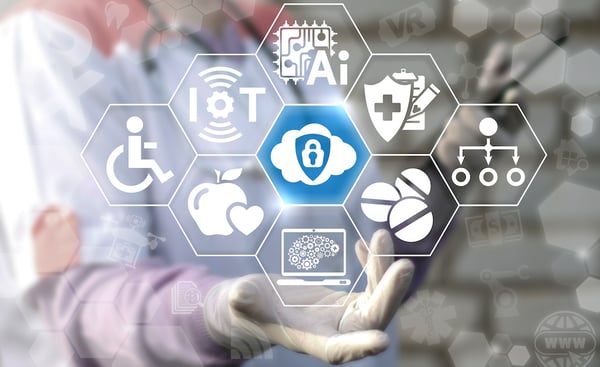Researching Healthcare Cybersecurity Companies: 11 Services You Want


The healthcare industry is under siege. Cybercriminals are going after healthcare organizations big and small, hoping to exploit security vulnerabilities that will allow them to access and steal or ransom off highly valuable patient health information (PHI). The bad news doesn't stop there: The cost to remediate a healthcare data breach is reported to be much greater than that of other industries.
To effectively safeguard your sensitive data, such as PHI, payment details, personally identifiable information (PII), and intellectual property related to medical research and innovation, healthcare organizations, including medical groups, ambulatory surgery centers (ASC), and community health centers, must strengthen their defense and stay ahead of cybercriminals.
However, developing an in-house information technology (IT) team, including staff with cybersecurity expertise, and purchasing the latest technologies that can strengthen security and address vulnerabilities require substantial investment. That's why more organizations are turning to healthcare cybersecurity companies to help them strengthen their defense and stay HIPAA compliant.
At Medicus IT, we're seeing an increase in the number of organizations seeking managed cyber services, usually as part of a broader scope of managed IT services. I have found that we often hear from organizations interested in our managed cyber services when they have already experienced a cyber incident, had a "near miss," or learned of a similar organization that fell victim. News of successful ransomware and other attacks is also motivating organizations to take a closer look at their cybersecurity defenses and ways to fortify them.
As I know through experience as well as conversations with clients and other healthcare organizations, such work is time-consuming and, as I noted above, expensive. In addition, organizations often lack the internal IT expertise needed to consistently and effectively treat cybersecurity as the priority that's required to keep cybercriminals at bay. This is often what motivates organizations to bring in experts like ourselves.
If you are researching healthcare cybersecurity companies, that's great. While I hope you will consider Medicus IT as your potential partner, I want to make sure that whoever you select will address all the facets of a strong cybersecurity program and strategy.
11 Services To Look For When Researching Healthcare Cybersecurity Companies
When it comes to healthcare cybersecurity, the best defense is a good offense. You must proactively stay at least one step ahead of various types of attacks, such as ransomware, data breaches, distributed denial of service (DDoS) attacks, insider threats, and fraud attempts.
An experienced healthcare cybersecurity company can help your healthcare organization implement many simple yet effective strategies to complement advanced technologies. Let's review some of the more critical healthcare cybersecurity services and how they can help your organization better protect its data.
1. Endpoint protection
Endpoint security measures (e.g., network access control, antivirus software, encryption) protect end-user devices, such as desktops, laptops, smartphones, tablets, and IoT devices, from risky user behaviors or cyberattacks. It allows you to manage the growing number of devices involved in delivering care and running your operations while providing secure remote access to partners and employees — all while staying compliant with privacy regulations.
2. Multi-factor authentication (MFA)
This authentication method requires users to provide two or more verification factors (e.g., security token, code sent via SMS, fingerprint) to access your network, cloud applications, and other software and systems that may contain sensitive data. MFA, sometimes referred to as two-factor authentication, is a cost-effective method way to add layers of protection to your system since usernames and passwords — while still important — can be stolen by hackers and are more vulnerable to brute force attacks.
3. Predictive security enforcement
AI-powered technologies allow you to collect and analyze large amounts of data from your network to identify abnormal activities, thus helping you take preventive actions. Using predictive analytics, you can protect your network from next-generation attacks and zero-day viruses, detect and deter threats in real-time, and block hackers before they have the chance to strike.
4. Automated breach detection and response
Using software that gathers and analyzes large amounts of endpoint data, security teams can get automated alerts so they can immediately respond to suspicious behaviors, malware attacks, and other threats. Some software also addresses threats automatically by removing or containing them. Such early detection is essential to minimizing damages and remaining HIPAA compliant.
5. Encryption
Encryption scrambles data so only authorized users with the decryption key can access the information. It protects your communications and data while they're at rest, in transit, or in use. Encryption also prevents unauthorized personnel from accessing sensitive data if a device is lost or stolen. You can better ensure data integrity by preventing malicious actors from altering the information via on-path attacks. Additionally, encryption is yet another essential service for complying with HIPAA.
6. Dark web monitoring
This identity theft prevention measure helps your organization monitor confidential information on the dark web so you can act immediately to limit the damage of a data breach. Also, if any employees' login credentials surface on the dark web, you can take precautionary steps to protect your network from unauthorized access.
7. Penetration testing
Also called pen test, this is a security exercise where your healthcare cybersecurity service provider attempts to find and exploit vulnerabilities in your system. The simulated attacks will help you identify weak spots so you can allocate resources strategically to strengthen your defense against the latest threats.
8. Security information and event management (SIEM)
A SIEM solution aggregates and analyzes activities across all the systems and software in your entire IT infrastructure to help discover trends, detect threats, and respond to alerts in a more cost-efficient manner. Such coordination is particularly important for healthcare organizations because they use many different applications to manage various aspects of the practice (e.g., EHR, online scheduling, billing, payment processing) and duplicate alerts can slow down responses to threats.
9. Anti-phishing technology
Phishing is one of the most common methods hackers use to infect computer systems with malware or ransomware, which cost healthcare organizations $20.8 billion in downtime in 2020. An anti-phishing solution identifies and blocks phishing emails. Some solutions scan the content of inbound and internal emails for signs that suggest a potential phishing or impersonation attack. You may also want to look for healthcare cybersecurity companies that leverage security awareness phishing campaigns to improve staff training and education.
10. Threat remediation
This process identifies and resolves threats before they can impact the security of your IT infrastructure. You can address security flaws immediately before cybercriminals discover and exploit vulnerabilities. You can also automate many threat remediation tasks to improve accuracy and cost efficiency. These include scanning the system to confirm fixes and applying patches as soon as they're released.
11. Server and PC management
The healthcare cybersecurity company you choose should monitor and help you maintain your servers and hardware. The company will make the necessary repairs and update configurations to eliminate vulnerabilities. The partner should also back up server systems and data to help ensure business continuity and minimize costly downtime if you experience a cyberattack.
Strengthen Your Preparedness and Response Managed Healthcare Cybersecurity Services
Keeping up with the latest cybersecurity best practices and regulatory compliance is an ongoing effort. A healthcare cybersecurity company that provides managed cyber services can provide you with access to a team of cybersecurity experts who will monitor your system and respond to alerts around the clock.
At Medicus IT, we understand healthcare IT and the high-stake security, safety, and compliance issues that come with it. I invite you to learn more about our security and compliance services to find the many ways we can help your organization. We look forward to hearing from you!
